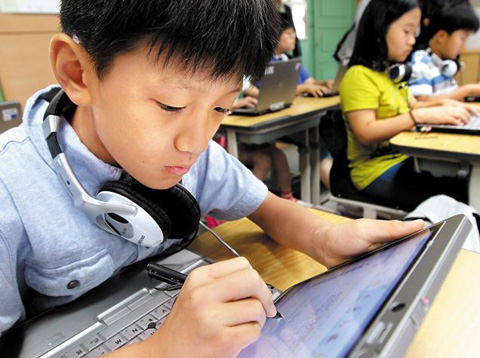All of South Korea’s Textbooks to Go Digital by 2015
In Blog Thick textbooks weighing on students’ shoulders might disappear across South Korea in four years, as the government seeks to convert all paper textbooks into digital versions by 2015, the Education Ministry said. Using smart phones, tablet PCs, and smart televisions, school students of all ages will be able to view the content of existing textbooks, ministry officials said. The ministry also seeks to hold nationwide academic tests online, they said. The ministry and the President’s Council on Informatization Strategies reported this plan on “smart education” to President Lee Myung-bak at the presidential office of Cheong Wa Dae, they said.
Thick textbooks weighing on students’ shoulders might disappear across South Korea in four years, as the government seeks to convert all paper textbooks into digital versions by 2015, the Education Ministry said. Using smart phones, tablet PCs, and smart televisions, school students of all ages will be able to view the content of existing textbooks, ministry officials said. The ministry also seeks to hold nationwide academic tests online, they said. The ministry and the President’s Council on Informatization Strategies reported this plan on “smart education” to President Lee Myung-bak at the presidential office of Cheong Wa Dae, they said.
In addition to the content of paper textbooks, supplementary materials and two-way study methods will be included in the digital textbooks. Some of the books will be customized to suit the needs of the physically challenged, officials said. The ministry plans to digitize all subjects for elementary school students by 2014 and for middle and high school students by 2015. It also plans to begin increasing online classes in 2013 for three years, so that those who cannot come to school owing to weather conditions or health problems can continue their studies outside of school.
In addition, the ministry plans to encourage students to take the “University-Level Program,” under which students will take college-level courses. And using Internet Protocol Television, it will run after-school programs to teach foreign languages, multiculturalism, and other subjects.
By 2014, all of South Korea’s elementary-level educational materials will be digitized, and by 2015, the entire school-age curriculum will be delivered on an array of computers, smart phones and tablets. While the country’s education ministry is yet to announce the make or model of the devices it will purchase, it has revealed it will spend $2.4 billion buying the requisite tablets and digitizing material for them.
Some schools on the peninsula are already using textbooks displayed on notebook computers, but when it comes to choice of tablets, how likely is it that the government will choose the iPad or any other tablet other than those manufactured by South Korean electronics giant Samsung, such as the Samsung Galaxy Tab or some larger variant of it?
This move also re-ignites the age-old debate about whether or not students learn better from screens or printed material. Equally important, there’s the issue of whether or not devices with smaller form factors are as effective as current textbooks, which tend to have significantly more area on each page. The now-defunct Kno is the only tablet to take on the textbook in its original dimensions.
That might sound like a trivial detail, but before it abandoned its hardware aspirations, the makers of the Kno tablet made a pretty good case that if we’re going to replace textbooks with their digital equivalent, we need devices with something like four times the screen territory of the iPad:
What a student needs, according to Kno’s research, is something that faithfully reproduces a full-size textbook, without compromise. In contrast, the attempt to cram a textbook onto a smaller screen is a primary reason that previous trials with replacing textbooks with e-readers such as the Kindle DX were abject failures.
Whatever happens, this is potentially a huge windfall for Samsung. Students and governments are the ultimate captive audience. As long as their hardware and software continue to improve, they might not have to compete with Apple; this is a whole other niche.

